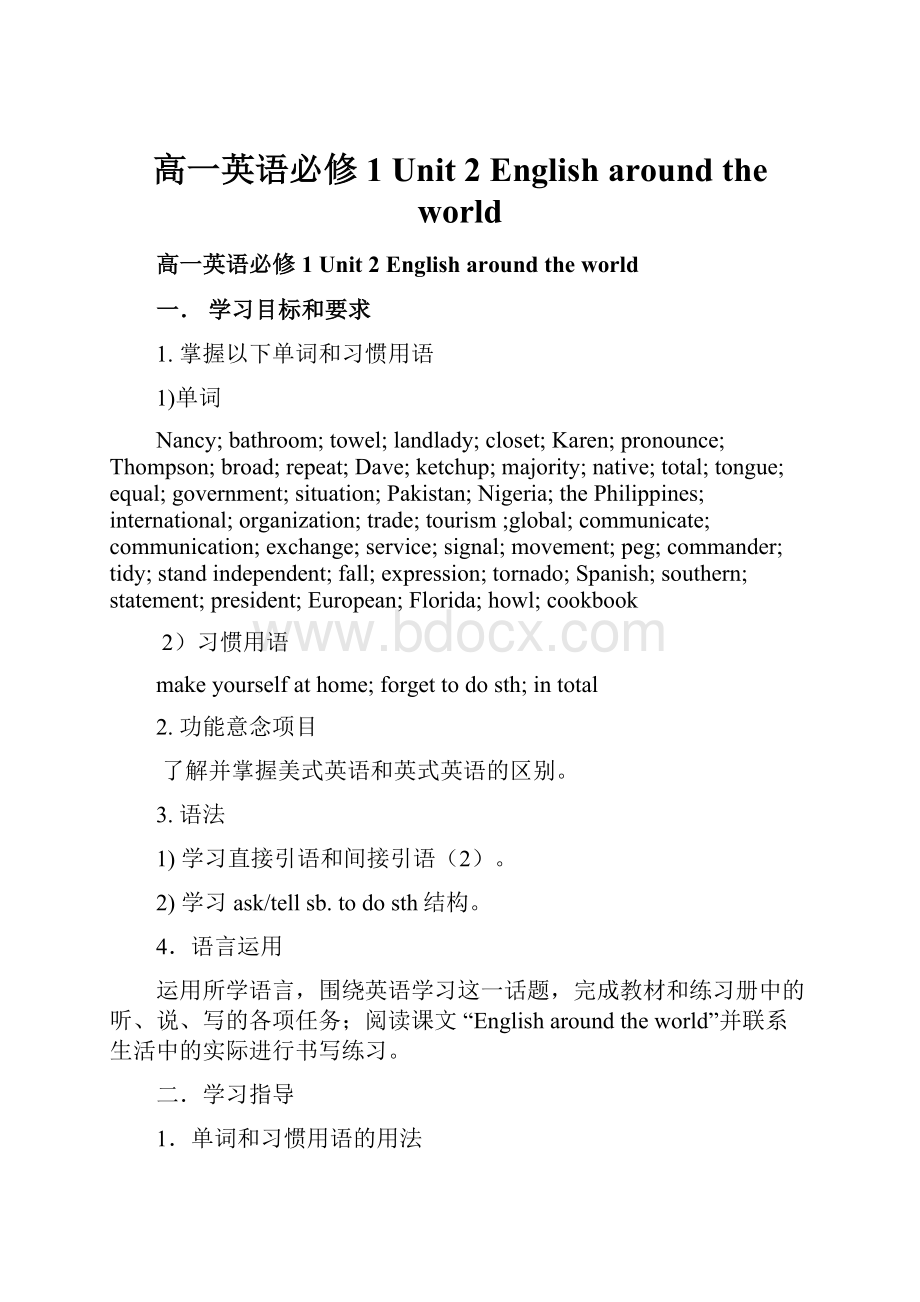高一英语必修1 Unit 2 English around the world.docx
《高一英语必修1 Unit 2 English around the world.docx》由会员分享,可在线阅读,更多相关《高一英语必修1 Unit 2 English around the world.docx(26页珍藏版)》请在冰豆网上搜索。

高一英语必修1Unit2Englisharoundtheworld
高一英语必修1Unit2Englisharoundtheworld
一.学习目标和要求
1.掌握以下单词和习惯用语
1)单词
Nancy;bathroom;towel;landlady;closet;Karen;pronounce;Thompson;broad;repeat;Dave;ketchup;majority;native;total;tongue;equal;government;situation;Pakistan;Nigeria;thePhilippines;international;organization;trade;tourism;global;communicate;communication;exchange;service;signal;movement;peg;commander;tidy;standindependent;fall;expression;tornado;Spanish;southern;statement;president;European;Florida;howl;cookbook
2)习惯用语
makeyourselfathome;forgettodosth;intotal
2.功能意念项目
了解并掌握美式英语和英式英语的区别。
3.语法
1)学习直接引语和间接引语
(2)。
2)学习ask/tellsb.todosth结构。
4.语言运用
运用所学语言,围绕英语学习这一话题,完成教材和练习册中的听、说、写的各项任务;阅读课文“Englisharoundtheworld”并联系生活中的实际进行书写练习。
二.学习指导
1.单词和习惯用语的用法
1)flightn.[C]飞行;航班
Didyouhaveagoodflight?
你乘飞机一路愉快吗?
Theymadeasuccessfulflightacrosstheocean.
他们成功地飞越了这个大洋。
anon-stopflight不着陆飞行
around-the–worldflight环球飞行
2)directlyadv.直接地;一直地;直截了当地
Helookeddirectlyatus.
他直瞪瞪地看我们。
Hespeaksverydirectlytopeople.
他跟人们讲话很直率。
3)majorityn.[C](大)多数
TheLiberalPartyhasamajorityintheHouse.
自由党在议院中占多数。
Thecompanyholdsamajorityofthestock.
该公司拥有大多数股份。
ThemajorityofpeopleseemtopreferTVtoradio.
大多数人似乎都喜欢看电视,而不喜欢听收音机。
4)nativeadj.本国的;本土的;n.[C]本国人;本地人;土著人
(1)adj.本国的;本土的
nativecustoms当地风俗
HisnativelanguageisGerman.
他的母语是德语。
PotatoisnativetoAmerica.
马铃薯是美洲产的。
ManyforeignershavegonenativeinChina.
许多外国人在中国已入乡随俗。
(2)n.[C]本国人;本地人;土著人
anativeofLondon(Wales/India/Kenya)
伦敦人(威尔士人/印度人/肯尼亚人)
5)equaladj.相等的;同等的;平等的
Womendemandequalpayforequalwork.
妇女要求同工同酬。
Notallmenareequalinability.
不是所有的人都有同样的能力。
Onekilometerisequaltofiveeighthsofamile.
一公里等于八分之五英里。
n.[C]相等的事物;(地位)相同的人
Asanartist,sheknowsnoequal.
作为艺术家,她是无以伦比的。
LetAbetheequalofB.
设A等于B。
6)situationn.[U]位置,地点;地位;地势;
Measuresmustbetakentomeetthesituation.
必须采取措施以应付这种局面。
Thecountryisinacriticalsituation.
国家处于紧急状态。
adangeroussituationdifficultsituation
困难的处境危险的处境
economicsituationsb’sfinancialsituation
经济状况某人的经济状况
thegeographicalsituationagoodsituation
地理位置好的形势
theinternationalsituationthedomesticsituation
国际形势国内形势
7)internationaladj.国际的;世界的
Theysignedaninternationalagreementonnuclearwaste.
他们签定了关于核废料的国际协议。
Internationalbomberinternationaldateline
洲际轰炸机日界线
internationallawinternationalcall
国际公法国际长途
internationalconventions
国际惯例
8)organization[C]组织,团体;机构;机制
Hehadbeenengagedintheorganizationofastrike.
他一直从事组织罢工工作
buildup/establish/formanorganization
建立起一个团体
acharityorganizationacommercialorganization
慈善机构商业团体
aninternationalorganizationareligiousorganization
国际组织宗教组织
asocialorganizationawomanorganization
社会团体妇女组织
9)tourismn.[U]游览;观光;观光事业
Somecountriesobtainlargesumsofforeignexchangefromtourism.
有些国家靠观光事业赚取大量外汇。
10)communicatevi.交流;传递;传送
communicationn.[U]交流;传递
Deafpeoplecommunicatebysignlanguage.
聋人用手势交流。
Thetwofriendshaven’tcommunicatedwitheachotherforyears.
这两个朋友已经多年没有联系了。
communicateclearlycommunicatedirectly
清楚地表达直接交流
communicateofficially(unofficially)
正式[非正式]地交流;官方[非官方]地交流
11)knowledgen.[C]知识;学识
Wemustbroadenandenrichourknowledge.
我们必须扩展和丰富我们的知识。
Hehasawideknowledgeofhistory.
他具有丰富的历史知识。
absorbknowledgeacquireknowledge
吸取知识获得知识
accumulateknowledgedemandknowledge
积累知识需要知识
spreadknowledgeactualknowledge
传播知识实际知识
allbranchesofknowledgebackgroundknowledge
各门学问背景知识
commonknowledgeanelementaryknowledge
常识基础知识
extensiveknowledgegeneralknowledge
广阔的知识一般知识
12)makeyourselfathome
请不要拘束,随便一些
13)forgettodosth.表示忘记要做某事
Iforgottotellheraboutit.
我忘记告诉他这事了。
Heforgottobuyanewspaper.
他忘了买报纸了。
forgetdoingsth.忘记曾做过某事
Iforgottellingheraboutit.
我忘记了曾把这事告诉过他。
14)intotal总共;总计
Howmanypeopletookpartintheactivityintotal?
15)mothertongue母语
Whatisyourmothertongue?
Chineseismymothertongue.
你的母语是什么?
是汉语
2.语言要点
1)Youmustbeverytired.
表示肯定推测一定正在做某事
must+bedoingsth.一定正在做某事
Hemustbewritingalettertohisparents.
Shemustbewaitingforhim.
Hemustbetellinglies.
Musthavedonesth.对过去的事情的肯定推测
Itmusthaverainedlastnight.
Youmusthaveseenthisplaybefore.
注意:
反义疑问句的形式
Itmusthaverainedlastnight,didn’tit?
Hemusthavefinishedhisexperiment,haven’the?
虽然Must表示肯定推测,但mustn’t却一定不能表推测。
表示不可能的时候我们采用can’t。
2)InChinastudentslearnEnglishatschoolasaforeignlanguage,exceptforthoseinHongKong.
除了香港以外,中国学生都把英语当成一门外语学习。
exceptfor结构:
表示对一个人或事物先做一个总体评价,然后就其局部提出一点看法,意为“除去……一点以外”,“只是……”
Yourcompositionisgoodexceptforafewspellingmistakes.
你的作文很好除了有一点拼写错误以外。
Thecarpetisgoodexceptforitsprice.
地毯很好,只是价钱太高。
ExceptforJohn,thewholeclasspassedthetest.
除了约翰以外,全班考试都通过了。
3)WithsomanypeoplecommunicatinginEnglisheveryday,wecanseethatitwillbemoreandimportanttohaveagoodknowledgeofEnglish.
with+宾语+形容词/副词
Hesleptwiththewindowopen.
他开着窗户睡觉
Hewasworkingtherewithonlyashirton.
他只穿一件衬衫在那干活。
with+宾语+介词短语
TheteachercameintotheclassroomwithabookInhishand.
老师手里拿着书走进了教室。
with+宾语+doing
Withnightcomingon,westartedforhome.夜幕降临我们就动身回家了.
ThemeetingendedwithallsingingtheInternational.会议以全体高唱国际歌结束。
with+宾语+done
Hewentawaywithoutawordmorespoken.他没再说一句话就走了。
Hestoodforaninstantwithhishandstillraised.他站了一会,手依然举着。
With+宾语+todo
Withnothingtodo,Iwentoutforawalk.由于没有什么事可做,我便到外面去散步。
Withmachinerytodoallthework,theywillsoonhavegotinthecrops.
由于所有的工作都由机器进行,他们将很快收完庄稼。
3.语法说明
1)学习直接引语和间接引语
(2):
(1)祈使句:
直接引语是祈使句,变为间接引语时,在原祈使句前加to或否定的加notto。
人称的变化
Hesaid,“Ilikeitverymuch.”他说:
“我非常喜欢它”
Hesaidthathelikeditverymuch.他说他非常喜欢它。
Hesaidtome,“I’veleftmybookinyourroom.”
他对我说:
“我把书放在你的间了”
Hetoldmethathehadlefthisbookinmyroom.他告诉我他把书放在我的房间了。
时态的变化:
如主句的谓语动词是一般过去时。
直接引语变间接引语时,从句的谓语动词在时态方面要做相应的变化。
如主句的谓语动词是现在时,从句的时态则无需变化。
直接引语转换成间接引语时态的变化
例句
直接引语
间接引语
一般现在时一般过去时
现在进行时过去进行时
现在完成时过去完成时
一般过去时过去完成时
过去完成时不变
一般将来时过去将来时
Hesaid,“I’mafraidIcan’tfinishthiswork”
Hesaid,“I’musingtheknife”
Shesaid,“IhavenotheardfromhimsinceMay.”
Hesaid,“Icametohelpyou.”
Hesaid,“Ihadfinishedmyhomeworkbeforesupper.”
ZhouLansaid,“I‘lldoitafterclass”
Hesaidthathewashewasafraidhecouldn’tfinishthatwork.
Hesaidthathewasusingtheknife.
ShesaidthatshehadnotheardfromhimsinceMay.
Hesaidthathehadcometohelpme.
Hesaidthathehadfinishedhishomeworkbeforesupper.
ZhouLansaidthatshewoulddoitafterclass.
指示代词,时间状语和动词的变化
直接引语转换成间接引语的变化
例句
直接引语
间接引语
Thisthat
这个那个
thesethose
这些那些
nowthen
现在那时
todaythatday
今天那天
yesterdaythedaybefore
昨天前一天
tomorrowthenext(following)day第二天
herethere
这里那里
comego
来去
Shesaid,“Iwillcomethismorning”
Hesaid,“Thesebooksaremine.”
Hesaid,“Itisnineo’clocknow.”
Hesaid,“Ihaven’tseenhertoday.”
Shesaid,“Iwentthereyesterday.”
Shesaid,“I’llgotheretomorrow.”
Hesaid,“Mysisterwasherethreedaysago.”
Shesaid,“Iwillcomeherethisevening.”
Shesaidthatshewouldgothatmorning
Hesaidthatthosebookswerehis.
Hesaidthatitwasnineo’clockthen.
Hesaidthathehadn’tseenherthatday.
Shesaidthatshehadgonetherethedaybefore
Shesaidthatshewouldgotherethenext(following)day.
Hesaidthathissisterhadbeentherethreedaysbefore.
Shesaidthatshewouldgotherethatevening.
注:
直接引语如果是客观真理,变为间接引语时,时态不变。
Hesaid,“Lighttravelsmuchfasterthansound.”
Hesaidthatlighttravelsmuchfasterthansound.
2)代词用法复习:
种类:
人称代词、物主代词、反身代词、指示代词、疑问代词、不定代词、
用法:
物主代词
形容词性物主代词有:
myyourhisheritsouryourtheir一般作定语。
名词性物主代词有:
mineyourshishersitsoursyourstheirs一般作主语宾语和表语。
反身代词:
myselfyourselfhimselfherselfitselfourselvesyourselvesthemselves一般作宾语、表语、同位语
指示代词
英语中的指示代词有thisthatthesethoseit
suchsame等指示代词一般作主语、宾语、表语和定语
注意:
一般指以后要说的事,this是对下文而言。
而that一般指已说的人和事物,对上文而言。
疑问代词:
疑问代词有whowhomwhosewhatwhichwhoeverwhateverwhichever.疑问代词一般位于句首,构成特殊疑问句。
不定代词
不定代词有both、either、neither、all、none、each、every、some、any、another、other、no
both表示两个人或事物(所修饰词和谓语动词为复数形式)具有形容词和代词的特征,可做主语、宾语、定语和同位语
either表示两者中的一个,这个或那个,所修饰的谓语动词为单数。
具有形容词和代词的特征,可作主语、宾语和定语
注意:
还可作副词在否定句中意思是“也”
Neither表示两者中的任何一个也不,所修饰词和谓语动词为单数,具有形容词和代词的特征,可作主语、宾语和定语
all表示三者以上的人或事物译为全体或都,所修饰词和谓语动词为复数。
注意:
有时表示不可数的东西,谓语动词用单数。
none表示没有一个人和东西的意思,多表三者以上的人或事物。
只有代词特征,故不能作定语。
可作主语(如想到所有人的情况,谓语动词用复数形式,如谈每个人的情况,谓语动词用单数形式),还可做宾语和同位语。
如:
Noneofusareperfect.
Noneofthemhasthatkindofexperience.
Afriendtoallisafriendtonone.
Wenoneofussaidanything.
No这一不定代词是没有的意思,只有形容词的特征,只能作定语。
Timewaitsfornoman.
Nomanisbornwise.
It’snotroubleatall.
each表示每一、各、各自的意思。
具有形容词和代词的特征,所修饰词和谓语动词为单数形式。
可作主语、宾语、定语和同位语。
如:
Eachofushassomethingtosayonthesubject.
Eachoftheroomsissixteenfeetsquare.
Ourclassteacherhadatalkwitheachofus.
Eachmonthwehadameeting.
WeeachhaveanEnglishbook.
every是每一个的意思,具有形容词的特征,只能作定语。
如:
Everyroomisbrightandtidy.
WehaveanEnglishclasseveryday.
注意:
alleveryboth的句子中如有not出现,为部分否定;如表示全部否定含义则需使用none或neither
Notalltheanimalshibernateinwinter.
不是所有的动物都在冬天冬眠。
2)Bothofusarenotdiligent。
我们不都勤奋。
3)Everyboyisn’there.
不是所有的男孩儿都在这。
4)Noneofthemarehere.
他们都不在这。
any和some意思是一些、任何,可修饰可数名词和不可数名词。
通常用于疑问句、
否定句和条件句。
Ihavesomequestions.
Thereissomewaterinthebottle.
Ifyouhaveanyquestions,pleaseask.
注意:
但在疑问句中表示问对方想吃